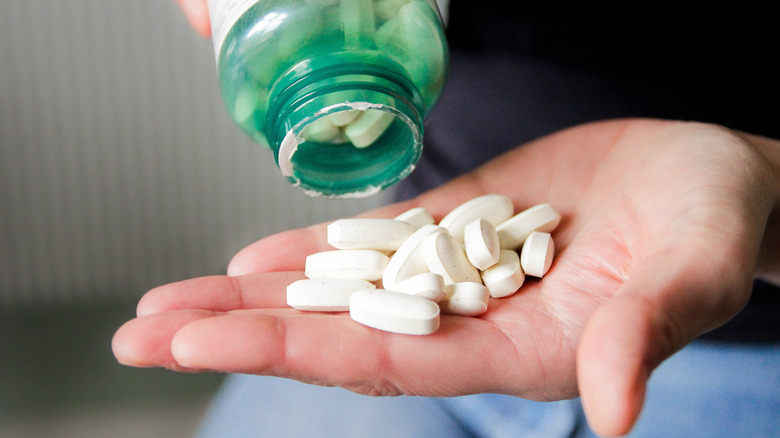When You Don't Get Enough Zinc, This Is What Can Happen To Your Sex Life
Vitamin D, magnesium, and omega-3s are some of the most popular supplements out there, but during the COVID pandemic, more and more people started reaching for zinc, according to Consumer Lab. Zinc plays a big role in keeping your immune system strong and helping wounds heal. For older adults, getting enough zinc might help lower inflammation, reduce the risk of infections, and even protect against age-related macular degeneration.
If you're not getting enough zinc, you might notice some unpleasant side effects like diarrhea, thinning hair, brittle nails, low energy, or a loss of appetite. Men's Health Urologist Justin Houman MD, FACS tells Health Digest that men with a zinc deficiency may also notice problems with their sexual health. Zinc is needed to produce testosterone, so a zinc deficiency may lead to low testosterone.
"Since testosterone is key to libido, erectile function, and sperm production, a deficiency may lead to low sex drive, erectile difficulties, and even fertility issues," Houman said. "Men with zinc deficiency may also experience fatigue and mood changes, which indirectly affect sexual desire and performance."
Zinc's role in sexual health
You need zinc to maintain your libido, support erectile function, and improve sexual vitality. "Zinc is one of the most essential trace minerals for male sexual health," Houman said. A 2023 study in Redox Report looked at the effects of zinc on male rats whose sexual function suffered from lead exposure. Zinc improved penile weight, sexual performance, and mating motivation. Zinc also boosts testosterone, nitric oxide, and dopamine.
Some men might experience infertility issues due to unhealthy sperm. "Zinc also plays a role in sperm development, motility, and count — making it especially important for men concerned about fertility," Houman said. According to a 2018 review in the Journal of Reproduction and Infertility, a zinc deficiency can lead to sperm abnormalities and low sperm count. Zinc protects your reproductive tissues and helps enable sperm to fertilize an egg. "Additionally, [zinc] has antioxidant properties that help protect the reproductive system from oxidative stress, which can impair hormone balance and sperm quality," Houman said.
Zinc may also play a crucial role in prostate health, according to a 2020 review in Frontiers in Oncology. The prostate relies on zinc to produce and release citrate, a key component of prostatic fluid. Zinc also moderates energy production in prostate cells. Men with benign prostatic hyperplasia (BPH) and prostate cancer often have lower zinc levels, which may enable healthy and abnormal prostate cell growth.
What is the optimum amount of zinc for low testosterone?
Houman says most adult men need 11 milligrams of zinc every day. You can easily meet your daily zinc requirement by eating foods such as oysters, meat, nuts, and legumes. "However, for men with low testosterone or fertility issues, supplementing with 15 to 30 milligrams daily may be beneficial–though this should always be done under medical supervision to avoid excessive intake," he said.
It may be easy to overdo it on zinc supplements. Remember that men's multivitamins and immune supplements like Airborne each have a full day's supply of zinc, and a zinc supplement may have 30 milligrams. If you take all three, you could be getting more than 50 milligrams of zinc. "Taking too much zinc (typically above 40 mg/day long-term) can lead to negative effects, including impaired immune function and reduced levels of other essential minerals like copper," Houman said. "So, it's all about finding the right balance." Zinc supplements can also interact with medications such as antibiotics and thiazide diuretics, so be sure to check your current medications for any zinc interactions.



